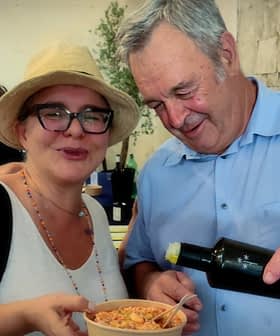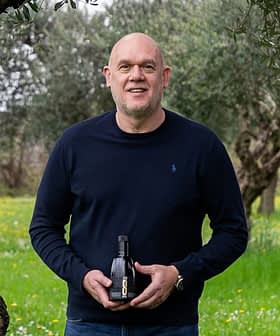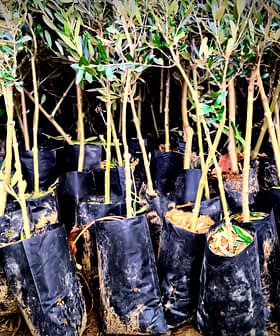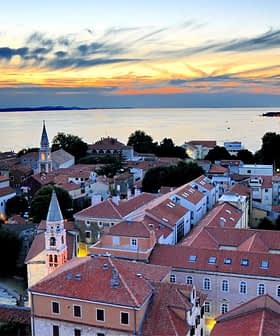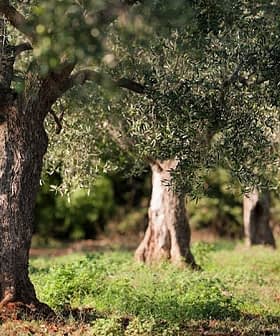Experiment with North African Olive Varieties Bears Fruit in Croatia
One producer has found that his Chemlali and Moroccan Picholine trees are thriving in Dalmatia’s increasingly hot and dry climate.
 Ivica Vlatković
Ivica Vlatković  12.7K reads
12.7K readsIvica Vlatković, a leading olive producer in Croatia, has found that North African olive varieties such as Chemlali and Moroccan Picholine are well-suited to the climate in southern Croatia, producing high-quality olives. Vlatković has spent the last decade grafting these North African varieties with local ones, leading to increased fertility and resilience in his olive grove in Dalmatia.
Olive varieties native to North Africa are becoming some of the best suited for the climate in southern Croatia, one of the country’s leading producers has found.
Ivica Vlatković, an award-winning producer and president of the Association of Olive Growers of Zadar County, has spent the last decade grafting Chemlali and Moroccon Picholine olive trees with the local Oblica variety.
I realized that the African varieties are growing in more favorable climatic conditions for better bud differentiation, which means better fertility.
His 500-tree olive grove, situated above the picturesque town of Novigrad in northern Dalmatia, comprises mostly local varieties, combined with some Italian, Greek and North African ones.
“The African olive varieties of Chemlali and Moroccan Picholine produced the best this year,” Vlatković said. “Studying the olive varieties, I realized that the African varieties are growing in more favorable climatic conditions for better bud differentiation, which means better fertility.”
See Also:Unraveling the Mystery Behind Slovenia’s Dramatic Fruit DropHe added that his Chemlali and Moroccan Picholine trees had demonstrated “extraordinary,” uniform fertility due to the absence of the alternative bearing cycle in these varieties.
Vlatković also praised the resilience of his Chemlali trees. After strong winds damaged the north-facing branches of some of his trees, Vlatković was still able to harvest a modest crop from the south-facing branches of those same trees.
Along with their hardiness, Vlatković also believes that climate change has made the Chemlali and Moroccan Picholinhe varieties particularly suitable for Dalmatia.
Average annual temperatures have continued to warm each year and now resemble those typical of North Africa in the summer. Periods of dry spring weather also have transformed into more extended dry periods throughout the summer.
However, olive trees can cope with this arid climate in North Africa due to the temperature differential during the days and nights. Significantly cooler nighttime temperatures resulted in dew forming, providing much-needed water to the trees.
Unlike in North Africa, temperatures remain steady throughout the day and night on the Dalmatian mainland and its coastal islands. As a result, Vlatković installed irrigation to replace the absence of the dew each morning.
“I don’t irrigate the olives. I spray them,” he said. “This way, 10 times less water is used, and the effects are better. The olive is a crop of an arid, dry climate, and it requires moisture at the right time, which is summer.”
“It has developed the ability to absorb moisture through the leaves quickly,” Vlatković added. “In this way, these olives live and bear fruit without rain.”
Along with their resilience to Dalatia’s increasingly arid climate, Vlatković said the resulting olive oil also has a distinct flavor. “Chemlali oil has a pronounced spiciness and pleasant bitterness,” he said.
Vlatković received his first Chemlali seedlings from the Institute of Adriatic Culture near Split, where a resident engineer gifted him seedlings from the parent tree.
According to Vlatković, the parent Chemlali tree was brought to Croatia – then part of Yugoslavia – after former president Josip Broz Tito visited an olive tree collection in Morocco and decided to bring some samples back with him.
“Reading about the value of these new olives, I realized that they are the most abundant in the Maghreb countries and that they are good oilseeds,” Vlatković said. “They probably go back to the distant past of the Phoenician route of the spread of olives across the Mediterranean.”
Along with North African varieties, he is also bullish that the rare Israeli variety, Barnea, will thrive in Dalmatia. He was first given a Barnea tree by a Croatian colleague living in France and planted the tree in his grove to honor the Israeli scientist, Shimon Lavee.
While Croatia is a long way off from producing olive oil from North African and Middle Eastern varieties on a commercial scale, Vlatković has turned his attention to the upcoming harvest.
He believes it will be fruitful if it rains by the end of this month. The same may be said for most Croatian olive groves irrigated during the previous dry period. The pits have turned brown, and now the oil is accumulating in the fruit.
“If the rains fall, everything will be saved, and it will be an above-average good olive growing year,” Vlatković concluded. “If the drought lasts until September, it will not be good for the yield or the quality of the oil.”
Share this article


